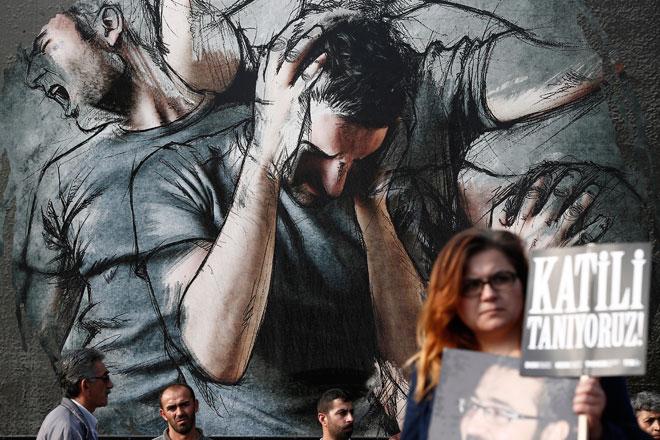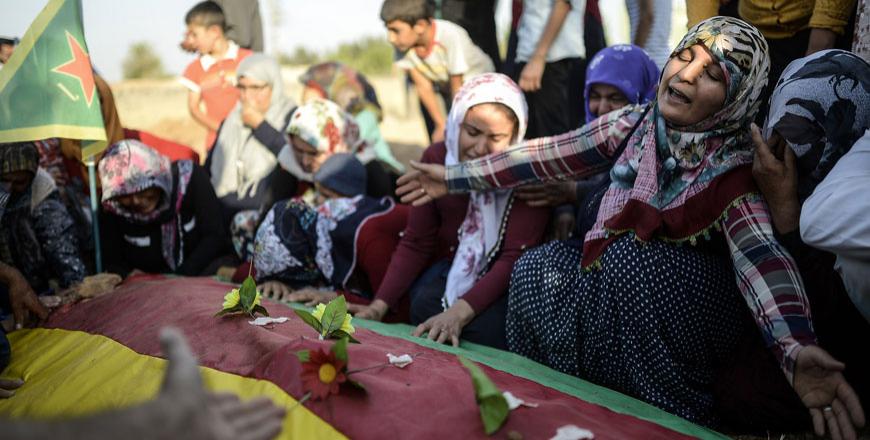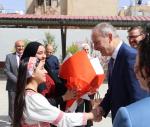You are here
PKK claims killing Turkish police to avenge ‘Daesh bombing’
By AFP - Jul 22,2015 - Last updated at Jul 22,2015
ANKARA — Kurdish militants on Wednesday claimed the murder of two Turkish police officers as revenge for a deadly suicide bombing near the Syrian border blamed on Daesh militants that killed 32 activists.
The attack by Kurdistan Workers' Party (PKK) militants in the town of Ceylanpinar intensified fears that the fighting raging in Syria between Kurds and Daesh extremists was spilling over onto Turkish territory.
In Ankara, Prime Minister Ahmet Davutoglu convened his Cabinet to discuss an action plan for strengthening security on Turkey's border with Syria after Monday's devastating attack in the town of Suruc.
Officials said the suicide bomber had been identified as a 20-year old Turkish student who had been in contact with Daesh jihadists for several months.
Access to Twitter was, meanwhile, blocked for several hours in Turkey after the a court imposed a blanket publication ban on images of the Suruc attack.
The authorities had earlier appeared at a loss to explain the shooting dead in the head of the two police at their shared home at a block of flats in Ceylanpinar.
But the military wing of the PKK — outlawed as a terrorist group by Turkey and its Western allies — said it had carried out the attack as a reprisal.
"A punitive action was carried out... in revenge for the massacre in Suruc," the People's Defence Forces (HPG) said in a statement on its website, accusing the two officers of cooperating with IS.
It described the attackers as an "Apoist team of self-sacrifice", in reference to the PKK's jailed leader Abdullah Ocalan whose nickname is "Apo" or "uncle".
Students killed
The victims of the Suruc attack on Monday were activists, many of them students, who had gone to Suruc to prepare an aid mission for the Syrian town of Kobani just over the border.
A Turkish official said DNA testing had confirmed a 20-year-old Turkish man reportedly linked to Daesh militants carried out the suicide bombing.
"As a result of DNA tests, we confirm that the assailant is a 20-year-old man registered in Adiyaman," the official told AFP on condition of anonymity, referring to a province in southeastern Turkey.
Media reports had said the man — a university student identified by his initials S.A.A. — had first become involved with Daesh militants two months ago.
The group, which has captured swathes of territory in Syria and Iraq adjoining the Turkish border, has so far not claimed the Suruc bombing.
The Suruc strike was the first time the Turkish government directly blamed Daesh for a strike inside the country.
Turkish authorities are also investigating if there is any connection between the Suruc assault and a deadly attack in the Kurdish majority city of Diyarbakir last month that killed four people.
Turkey has long been accused by its Western partners of failing to properly control the 911-kilometre frontier and even of colluding with Daesh, allegations it fiercely denies.
But Davutoglu said in a message on Twiter that IS and "similar terrorist organisations will never achieve their target”.
The unrest has come at a critical time in Turkey following elections where the ruling Justice and Development Party (AKP) of President Recep Tayyip Erdogan lost its overall majority in parliament for the first time since coming to power in 2002.
Tensions are running high and the pro-Kurdish Peoples' Democratic Party (HDP) has called for a major "rally for peace" on Sunday afternoon in Istanbul.
Pro-Kurdish demonstrations in Istanbul over the last two days have been dispersed by the police using water cannon and tear gas.
Max Abrahms, professor of political science at Northeastern University and a member at the US Council on Foreign Relations think-tank, told AFP the PKK attack was a message for the Turkish government.
"The violence is intended to convey that Turkish officials are at risk if they continue to aid Islamic State [Daesh] at the expense of the Kurds."
Meanwhile, a Turkish court ordered a ban on publishing of images of the deadly suicide bombing in Suruc on all print, visual and online media, including Twitter.
Turkish users had earlier reported problems in accessing Twitter after the court order. By 4:00pm (1300 GMT), access had been restored.
"We notified Twitter about 107 URL addresses that must be removed in compliance with the court order," the official told AFP, saying that Twitter blocked those addresses after talks with the government.
The official said the blockage on Twitter was a "technical matter".
Related Articles
ISTANBUL — Turkish prosecutors said Monday they had remanded four people in custody over a deadly Ankara attack, as the identity of one of t
ANKARA — A suicide bomber attacked Monday a cultural centre hosting anti-Daesh activists in a Turkish town near the border with Syria, killi
SURUC, Turkey — Turkey said Tuesday it had identified a suspect over a devastating suicide bombing on the border with Syria blamed on Daesh


















